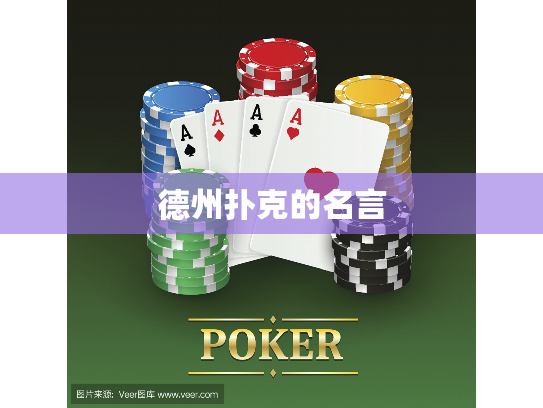德州扑克的名言

Texas Poker's Most Famous Saying: "Know When to Fold 'Em" - Your Key to Winning Decisions You stare down at your cards - Ace-King suited. The flop comes Jack-10-9 with two of your suit. A powerful draw, top pair potential. The initial raiser makes a continuation bet. Your gut says push, but a voice whispers that famous Texas Poker wisdom: "You gotta know when to hold 'em, know when to fold 'em." Your chips hover over the betting line... hesitation sets in. This agonizing moment, the battle between greed and discipline, is where countless players bleed chips unnecessarily. Mastering this core skill of precise fold timing separates the consistent winners from the hopeful losers. Why "Fold 'Em" Is the Hardest (Yet Most Crucial) Skill Let's be brutally honest: folding feels terrible. It feels passive. It feels like giving up. Especially after you've invested chips in a pot. The temptation to "see one more card" or "see what they have" is immense. You convince yourself you might hit that miracle river or that your opponent might be bluffing. This emotional trap, ignoring the fundamental Texas Poker strategy of disciplined folding, is the single biggest leak for intermediate players. Data from major online platforms in early 2025 revealed that players losing at micro-stakes could attribute over 65% of their net losses to incorrect calls in spots where a profitable fold was the mathematically superior play. They weren't necessarily making huge blunders; they were simply calling bets just a little too often when they were statistically beaten. That seemingly small leak, multiplied over hundreds of hands, is devastating. Unpacking "Know When": The Three Pillars of a Winning Fold So, how do you transform that cliché into actionable, winning poker decision making? It's about understanding the why behind the fold. Consider these pillars:
- Hand Strength vs. Board Texture: Your Ace-King looks great pre-flop, but on that Jack-10-9 flop? It's now just Ace-high with a backdoor flush draw. Against a player who raised before the flop and bet again after the flop, their range likely includes strong Jacks (AJ, KJ, QJ), sets (JJ, TT, 99), and strong draws themselves like open-ended straight draws or flush draws that dominate yours. Your Ace-King isn't strong here, right now. Your draw needs help.
- Opponent Tendencies & Betting Patterns: Who are you facing? Is the initial raiser known for tight play, only betting strong hands? Or is this a hyper-aggressive player who bluffs frequently? Did their bet size scream value (trying to get paid) or seem like a probing bet? In our example, if the raiser is tight, their continuation bet on a coordinated board like this often signifies genuine strength, making your Ace-high draw incredibly vulnerable. Even against an aggressor, your weak hand might not be the best one to fight back with.
- Pot Odds & Implied Odds: This is the cold, hard math. If the pot is $100, and your opponent bets $50, you need to call $50 to win $150 total ($100 pot + $50 bet). That means you need at least a 33.3% chance of winning to break even ($50/$150). Can your Ace-high draw, facing likely strong opposition, realistically win here 34% of the time? Probably not. Factor in implied odds – how much more you might win if you hit your draw. On a scary board like J-10-9, if you hit your flush on the turn, will your opponent pay you off with their big hand? Maybe. But if you miss (which is likely), you face another big bet. Spotting the Fold Signal: Critical Scenarios Let's put this into practice with common situations where Kenny Rogers' advice becomes gold:
- Facing Large Bets on Scary Boards: The turn or river completes a possible flush or straight. Your opponent suddenly makes a pot-sized or larger bet. Holding only top pair or a weak draw? This screams value. Your top pair is likely crushed. Fold. Chasing here bleeds chips.
- Multi-Way Pots & Significant Action: You called pre-flop with a speculative hand like suited connectors. The flop misses you entirely. Two other players start betting and raising. Getting involved with nothing on a board that likely hit someone is financial suicide. Fold early.
- The Stubborn Call on the River: You chased your flush draw and missed. The river is blank. Your opponent bets, representing the hand that beat you. Holding Ace-high? The urge to make a "hero call" just to see is strong. Resist! This is often where disciplined players save the most money. Unless you have a strong specific read your opponent bluffs here relentlessly, folding is the correct poker play.
- Overvaluing Weak Hands Post-Flop: Pocket Fives under-the-gun. You call a raise, hoping to flop a set. The flop comes A-K-3. The pre-flop raiser bets. Your fives? They are almost certainly useless now. Folding immediately saves your stack for better spots. Don't fall in love with a pair if it's likely the smallest pair at the table! From Theory to Practice: Sharpening Your Fold Reflex How do you ingrain this? It takes conscious effort:
- Review Hands WITHOUT Results: After your session, look at hands where you called big bets with marginal holdings, especially on the river. Ignore whether you won or lost! Ask: "Based on the board, opponent action, and pot odds, was this a mathematically sound call?" Be harsh.
- Use Equity Calculators Sparingly: Tools like Equilab or Flopzilla are great for understanding pre-flop ranges. Post-flop, use them sparingly during play (it's slow!), but review key fold decisions afterwards to see your actual equity. Seeing you had only 15% chance despite calling a bet needing 30% is eye-opening.
- Practice Mental Pot Odds: Get faster at estimating. Pot is $80, opponent bets $40? You need roughly 28.5% equity ($40 / $140 total pot). Can your hand realistically achieve that against their betting line? If the answer isn't a confident "Yes," lean heavily towards fold.
- Embrace the Fold: Start viewing a well-timed fold not as a loss, but as a victory. You avoided losing more chips. You preserved your stack for a better opportunity. You made a disciplined, professional decision. Celebrate that! The Discipline Dividend: Building Long-Term Profit The beauty of "know when to fold 'em" is that it's the cornerstone of bankroll preservation. Winning Texas Poker isn't just about the big pots you win; it's even more about the countless small and medium-sized pots you don't lose by making disciplined folds. Think of your chips as soldiers. Sending them into battle (calling bets) with a weak hand in a bad situation is sending them on a suicide mission. The disciplined fold keeps your army intact, ready to fight (and win) when you have a true tactical advantage – your premium hands or powerful draws on favorable boards. Mastering the fold transforms Texas Poker from a gamble to a game of skill and patience. It requires overcoming ego and emotion, relying instead on logic, observation, and math. It’s the shield that protects your stack, allowing the sword of well-timed aggression to build it. Next time you're in that crucial moment, chips hovering, remember Kenny's wisdom. Make the tough, disciplined fold. Your win rate will thank you. 以上就是由"攻略蜂巢"原创的《Texas Poker's Most Famous Saying: "Know When to Fold 'Em" - Your Key to Winning Decisions》解析,请大家以娱乐心态享受游戏乐趣,杜绝任何涉及金钱投注的行为。
